-
What Is Sustainability?
If you want to go green with your business practices, you may want to focus on improving the sustainability of your company . Sustainability is a term that encompasses many different factors, such as waste management, recycling, and use of resources. By committing to recycle your unused goods, rather than sending them to the trash pickup, you will be able to improve the sustainability of your company. A company that offers recycling serving Atlanta can provide you with additional information about the sustainable benefits of a recycling program.
Recycling improves the sustainability of a company in a few different ways. When you choose to recycle, you will cut back on the natural resources that are consumed by your daily business operations. Plastic recycling also frees up space in landfills. Finally, smart recycling practices can also help to cut back on the carbon footprint that is created by your company. Choosing to recycle is a component of any sustainable waste management program.
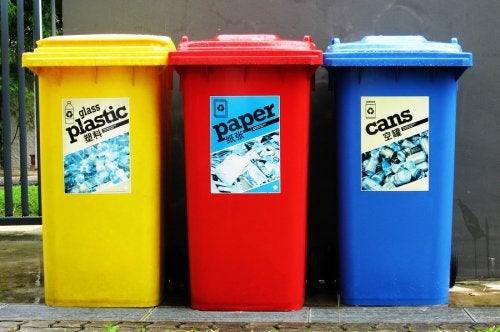
-
The Importance of Professional Waste Management
Residents in major urban environments, such as New York City, create significant amounts of trash every day. This video from The New York Times provides detailed information about the municipal waste management strategies that are in place for New York City. The New York City sanitization department works diligently to make sure that the city’s trash is picked up and disposed of in a safe and sanitary manner. Dumpsters in Atlanta, New York, and other urban centers are used to collect bulk waste.
When you are in need of recycling bins or dumpster rentals for your business, you will want to make sure that you work with a team of professionals. With services from a team of waste experts, you can make sure that your trash is properly contained and collected.
-
Reducing Industrial Pollution
As the owner or operator of an industrial facility, it is up to you to make sure that your methods and materials are environmentally friendly. Along with practicing smart waste management , there are other practices that you can implement that will help you to cut back on your pollution. With services from a company that specializes in managing waste near Atlanta, you can make sure that your waste disposal and pollution reduction methods are environmentally friendly.
There are several steps that you can take to reduce industrial pollution. Rather than tossing all of your waste in the dumpster, you may want to figure out whether some of these materials can be processed at the recycling center. As you are creating a waste management plan, you may also want to carefully assess that amount of emissions that are generated through your industrial processes. Cutting back on emissions will go a long way towards preserving the environment.
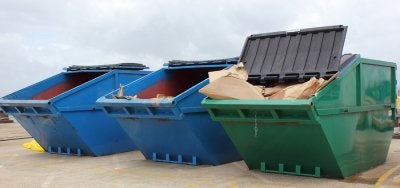
-
Encouraging Reduce, Reuse, Recycle in the Workplace
Whenever you implement a new waste management strategy for your company, it can be tough to ensure that all of your workers are on board with your plan. However, a company that specializes in recycling serving Atlanta will be able to help you plan smart strategies that will help all of your workers reduce their overall waste. After you have placed recycling bins throughout your office, it will be up to you to make sure that they are used properly. Here is a look at some tips that will help you encourage your workers to reduce, reuse, and recycle.
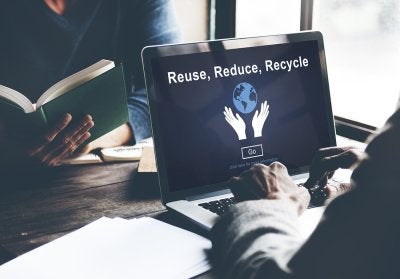
Make Your Waste Policies Known
One of the best ways to encourage your employees to reduce their waste production is to make sure that your business waste policies are clearly outlined for all of your workers. If you will be embarking on a new recycling program, you may want to send out a company wide memo that details the specifics of how to recycle in the workplace. By arming your workers with information about recycling, you can help them cut back on their waste.
Encourage Electronic Communication
Many businesses generate large amounts of paper waste throughout the course of a workday. Rather than having your employees print out all of their notes and correspondences, you may want to create a system that allows them to communicate electronically. Email servers, cloud computing, and other forms of technology have made it easier than ever to reduce the amount of paper waste that is generated in an office setting.
Clearly Label Your Recycling Bins
If your workers are unaware of how to correctly recycle their waste, they will have trouble following your waste management strategy. Once you have placed recycling bins around your office, you will want to clearly label them with their correct contents. For example, if a bin can only accept paper waste, you will want to label it with this information.
-
What to Know About Recycling Ferrous Materials
Do you make it a habit to recycle near Atlanta ? If so, then you might benefit from learning about recycling ferrous materials.
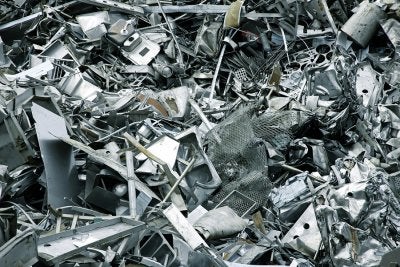
Ferrous and Non-Ferrous Metals
Scrap metal recycling involves collecting and sorting different metals, and then processing each type, and many people consider the scrap metal recycling industry to have 2 primary categories: ferrous and non-ferrous metal recycling. Ferrous metals are those that contain high amounts of iron, such as iron and steel. Some examples of non-ferrous metals include aluminum, stainless, steel, brass, bronze, and copper. Because of its molecular structure, iron has a much higher melting point than other metals. For this reason, not all metal recycling facilities are equipped to recycle iron, and many locations that do have different areas designated for ferrous and non-ferrous metals.
The Value of Ferrous Metals
Compared to metals like brass and copper, steel and iron aren’t particularly lucrative items to recycle. However, it’s worth bringing steel and iron with you to the scrapyard or putting it in the recycling bin, since doing so can lower your carbon footprint, reduce the amount of new ore that is mined, and keep the scrap metal out of a landfill. Steel is among the most commonly used metals worldwide, rusts easily, and attracts magnets. A magnet will also stick to iron.
The Ferrous Metal Recycling Process
The ferrous scrap metal recycling process begins with collection through residential, commercial, and industrial recycling programs. Next, the metal is brought to a recycling center where the different metals are sorted. To identify ferrous from non-ferrous metals, the scrap pieces pass beneath a magnet. Ferrous metals stick to this magnet, while non-ferrous metals remain on the conveyor. Then, the scrap metal is shredded and pressed into cubes to make it easier to process and transport. Once the ferrous metal cubes reach the smelting facility, they are melted into liquid molten metal and poured into molds to create ingots. Finally, the ingots are sold to industries to be used to fabricate new materials.
-
The Many Benefits of Recycling
Just about every material that we use as a society can be recycled, and the advantages of doing so impact more than just the environment. If you’re wondering if it’s worth your time to send your recyclable waste to a recycling center near Atlanta , then watch this video to learn about the benefits of this form of waste management.
Recycling steel, aluminum, and many other metals can be done repeatedly without affecting the properties of the materials. This makes metal recycling particularly beneficial because it prevents the need to mine new ore and requires less energy than processing raw materials. Also, recycling paper saves trees and reduces the amount of water and energy needed to make paper. Finally, plastic recycling is incredibly versatile, allowing plastic bags to be made into something completely new, such as insulation or clothing.
-
Recycling E-Waste
With the number of technological devices in use today, e-waste recycling serving Atlanta plays an important role when it comes to managing waste disposal . You’ve probably recycled a television, computer, or cell phone in the past, but have you ever wondered about the electronic recycling process? If so, then watch this video to see what happens when you recycle e-waste.
Most devices that have a cord or a circuit board can be processed at an e-waste recycling center. Using centrifugal forces, each electronic device that makes it to the plant is disassembled. Then, glass, plastic, copper, aluminum, and steel pieces are sorted and processed to be made into new materials.
-
Dealing with Waste in a School Setting
School is essential for shaping the minds of the next generation. Like any other productive and important institution, however, schools tend to produce waste. Whether you’re trying to come up with waste management solutions for an elementary school or a university, consider working with a waste management company in Atlanta to address the following considerations.
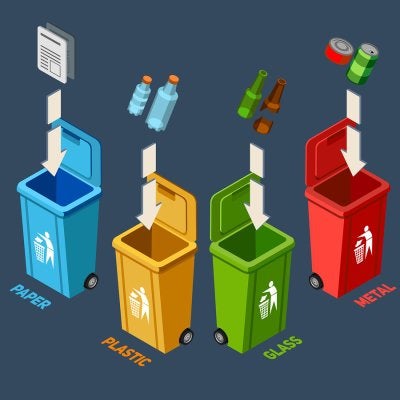
Determining Waste Generation
Before you can implement an effective waste management plan, you must first determine how much waste your school generates on average. It might be helpful to keep track of the waste from each department; that way, all the departments in your school can work together to reduce unnecessary waste.
Raising Recycling Awareness
Learning to recycle is important for preschoolers and grad students alike. You and your waste management company will find that recycling is a lot easier if the students put their waste in the right bins. As you begin a new partnership with recycling experts, consider teaching your students the basics of recycling. You might even have a designated recycler stand near the bins at lunchtime to make sure waste makes it into the appropriate places.
Setting Up a Recycling Program
Institutions that generate a considerable amount of waste can benefit from working closely with waste management companies. For example, you could ask your local recycling experts what to do with old desks or obsolete computers. Partnering with a local waste management company in Atlanta is a great way to ensure that your waste needs are met in a responsible manner.
Disposing of Delicate Paperwork
Students often need to provide schools with personal information during the admissions process. When the time comes to dispose of that information—usually years after the student has graduated—it’s the school’s responsibility to make sure it is done so in a discreet and responsible manner. Failure to do this could result in embarrassment or even identity theft.
-
What to Do with Old Computers
When people think about recycling in Atlanta , they often forget to consider electronics recycling. Many different types of commercial, industrial, and retail businesses generate electronics waste when they replace their broken appliances and equipment with new models. Your local waste management company or recycling center can offer you valuable information and recycling facts about how to dispose of old computers and other electronic devices.
When you throw an old computer into a dumpster, it is simply hauled away to a landfill during trash pickup. A computer will not decompose naturally, but it does contain many toxins that are bad for the environment and may seep into the soil in a landfill. Instead, you can arrange for bulky pickup or junk removal of your electronic devices through your waste management company. Some recycling centers reuse or refurbish computer parts, while others may donate working electronics to schools or charitable organizations.
If there is nothing to salvage or reuse in your computer, your recycling center will ensure that it is disposed of according to the federal and local laws. Reputable recycling centers will recycle electronic devices without resorting to using landfills, incinerators, prison labor, or selling it to a developing country.
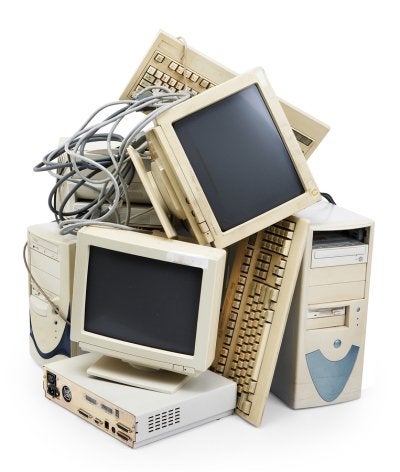
-
Essential Elements of Commercial Waste Management
Streamlining your commercial waste management practices can be a highly effective strategy for improving the profitability and sustainability of your business. With services from a company that specializes in waste management and recycling serving Atlanta , you will be able to determine which disposal methods will be best for your business. To ensure that your waste management provides your business with the best functionality, you will want to incorporate several essential elements.
Dumpsters, trash cans, and recycling bins are three essential commercial waste management tools. Trash cans are among the most important elements of a commercial waste management plan. Strategically placed trash cans can help you make sure that your employees and clients are throwing away their trash in the proper containers. Along with placing plenty of trash cans around your facility, you may also want to include recycling bins in your plan. At the end of the business day, a dumpster can be used to collect and house bulk amounts waste until it can be picked up.
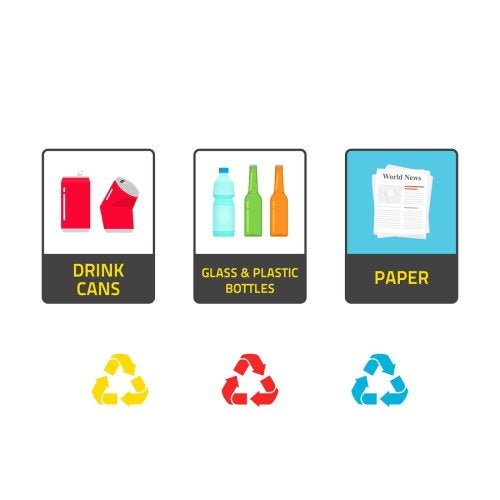
RECENT POSTS
categories
- Uncategorized
- Waste Management Atlanta
- Waste Disposal and Recycling
- Hazardous Waste Disposal
- Chemical waste removal
- solid waste removal
- R3 Program
- Sustainable Organizations
- Sustainable Waste Removal
- Commercial Waste Removal
- Materials Management Program
- Dumpster Rental
- Roll Off Dumpsters
- Construction Site Waste Removal
- Sustainability
- Recycling in Atlanta
- Industrial Recycling
- Industrial Waste Removal Services
- Southern Waste & Recycling
- Waste Removal Atlanta
- Waste Specialists
- Atlanta
- Infographic
- Front Load Dumpsters
- Rear Load Dumpsters
- Reusable Electronics
- Dump Truck Atlanta
- Recyclable Electronics
- Trash Compactors
- Recycling
- Recycling Program
- Office Recycling
- Metal Recycle
- Electronic Waste
